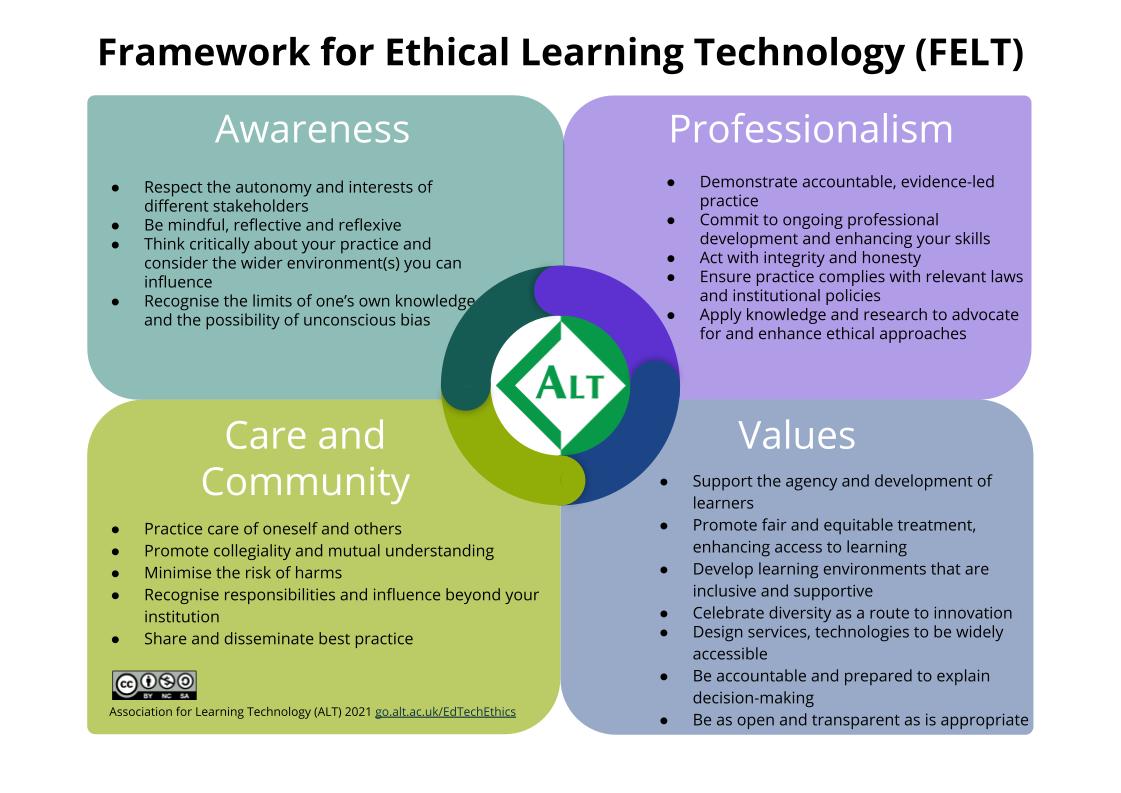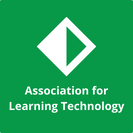
ALT’s Framework for Ethical Learning Technology (FELT) is designed to support individuals, organisations and industry in the ethical use of learning technology across sectors. It forms part of ALT’s strategic aim to strengthen recognition and representation for Learning Technology professionals from all sectors.
The need for such a framework has become increasingly urgent as Learning Technology has been adopted on a larger scale than ever before and as the leading professional body for Learning Technology in the UK, representing 3,500 Members, ALT is well placed to lead this effort.
We define Learning Technology as the broad range of communication, information and related technologies that are used to support learning, teaching and assessment. We recognise the wider context of Learning Technology policy, theory and history as fundamental to its ethical, equitable and fair use.
Building on ALT’s professional accreditation framework, CMALT, which was expanded to include ethical considerations for professional practice and research in 2019, a working group of 120 members helped define this framework alongside tools and resources for individuals, institutions and industry.
Scope of the framework
The purpose of this document is to articulate a framework for ethical professional practice in Learning Technology, not a set of rigid rules that apply to particular tools, technologies or contexts .
The framework is designed to address the diverse range of contexts in which Learning Technology professionals work and are aligned with CMALT. This framework is intended to be used alongside ethical policies for research as well as subject- or industry specific code of practice, such as BERA’s Ethical Guidelines for Educational Research, Farrow’s Framework for the Ethics of Open Education (2016) and IFLA Code of Ethics for Librarians and other Information Workers (2016).
How the framework was developed
The development of the framework was led by an open working group. The working group was led by ALT Trustees Bella Abrams, Sharon Flynn and Natalie Lafferty and includes learners and representatives from industry.
Work to establish ALT’s new ethical framework started in October 2020. Following the initial period of establishing the working group and holding regular meetings, we collected input and feedback which informed the next phase of work.
We would like to acknowledge the input of all members of the working group, everyone who has provided input during the consultation and in particular:
- Bella Abrams, Sharon Flynn and Natalie Lafferty who chaired the working group;
- Dr Robert Farrow and Professor John Traxler who provided input to the development of this document;
- Colleagues from the Open University and the University of Edinburgh who helped test and develop the contribution process.
We would also like to thank everyone who contributed resources and references which informed the development of the framework and all who commented on the early drafts and resources.
Thank you all for participating in this important strategic project.
Resources
The following resources are openly available:
Keep informed and contribute
The work to further develop the framework is now underway. We invite you to:
- Keep informed: Members will receive a quarterly update about the new framework. If you are not already a Member, consider joining or sign up to our public monthly updates;
- Join the summit: we are holding an annual summit meeting online, helping you learn about the new strategic developments and research;
- Contribute: We are actively looking for contributions in order to develop a robust baseline of policies and practice.
How to contribute
Year 1, September 2021 - September 2022
In the first year our focus is on collecting examples of case studies and policies from individuals and institutions. Specifically we are looking for:
- Open for submission > Example policies from other institutions (ideally openly licenced)
- Case studies of professional practice from different contexts
- Case studies from institutions
- Case studies from vendors/suppliers
Year 2, September 2022 - September 2023
In the second year our focus will be on developing pathways to accreditation and expanding the framework via mappings to other standards. Specifically we are looking for:
- Examples from accredited CMALT portfolios
- Mappings to other professional/ethical frameworks
Notes for Editors
- The ALT Framework for Ethical Learning Technology is licenced by the Association for Learning Technology (ALT) CC BY-NC-SA, September 2021. This license allows reusers to distribute, remix, adapt, and build upon the material in any medium or format for noncommercial purposes only, and only so long as attribution is given to the creator. If you remix, adapt, or build upon the material, you must license the modified material under identical terms.
- ALT (the Association for Learning Technology) is a professional and scholarly association which brings together those with an interest in the use of learning technology. As the UK’s leading membership organisation in the Learning Technology field, we work to improve practice, promote research, and influence policy.
- We have over 3,500 Members across education sectors in the UK and internationally.
- If you are writing about, blogging or sharing images and videos about the conference using tools that support tagging, please use the tag #altc21.
- Our Sponsors are listed at https://altc.alt.ac.uk/2021/sponsorship/meet-our-sponsors/ .
- More information about the conference: https://altc.alt.ac.uk/2021/ .
- Association for Learning Technology, Tel: +44 (0)1865 819 009 URL: http://www.alt.ac.uk/
- ALT is a Charitable Incorporated Organisation and Registered Charity in the UK, number: 1160039
